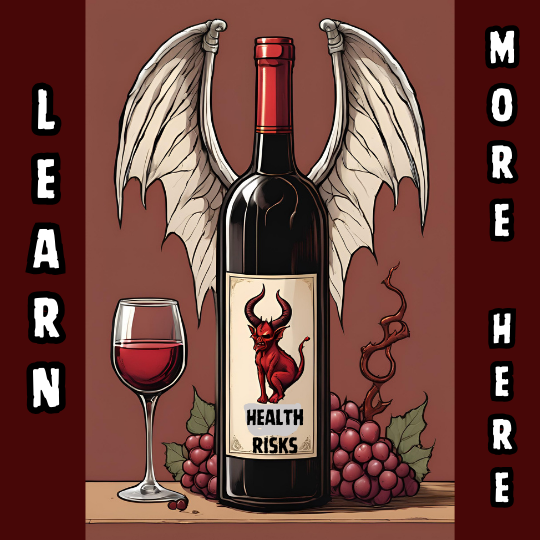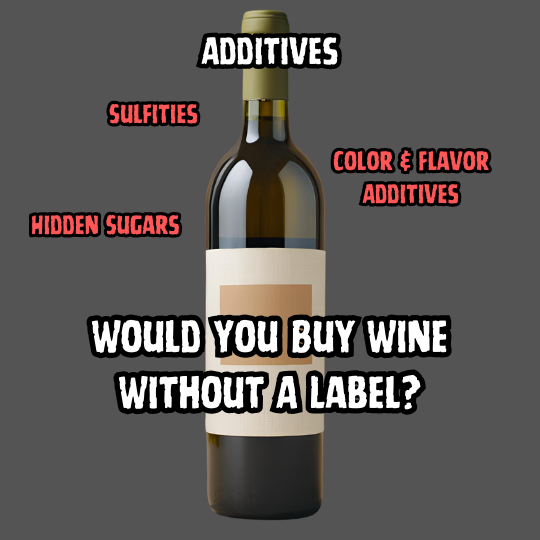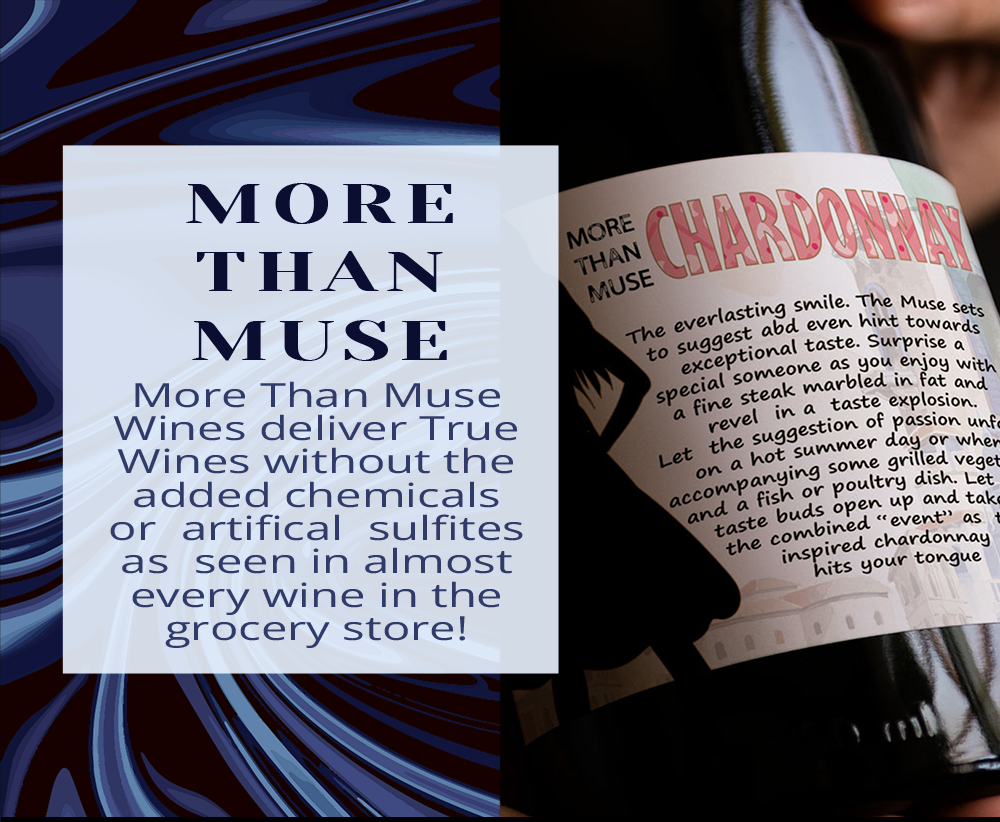So, let’s talk about the health risks of wine additives, shall we? Wine is often celebrated for its flavor, relaxation factor, and social appeal. But when it comes to what’s hidden in each sip, there’s a lot that might surprise you. In the wine industry; especially among big-name, commercial producers, additives sneak into bottles to tweak taste, color, or shelf life. (Want to learn more Truth About Wine Additives here.) While these substances might improve consistency and extend shelf life, they also come with some sneaky health risks. Let’s take a closer look at these common additives and their potential effects.
Health Risks Related to Wine Additives
For large-scale wine producers, the goal is often to ensure every bottle in a batch tastes the same. But achieving this means using additives to perfect each batch, creating uniformity in flavor, color, and even texture. These big-production practices may enhance taste but bring added baggage. Some additives can trigger allergies, irritate the gut, or cause other side effects. Let’s dive into a few specific additives and how they impact health.
- DMDC (Dimethyl Dicarbonate): DMDC is a chemical used by large wineries to keep bacteria and yeasts in check, but it can also lead to stomach issues for sensitive drinkers. If you’ve ever sipped wine only to end up with stomach pains, it might not be the alcohol alone. It could very well be the DMDC.
- PVPP (Polyvinylpolypyrrolidone): This chemical is used to clarify color but can cause reactions in sensitive people. For some, that beautiful glass of red could lead to hives, sneezing, or skin irritation. It might look smooth, but PVPP isn’t for everyone.
- Synthetic Enzymes: These enzymes stabilize flavors but may upset digestion in some people. Ever felt bloated after a glass? Enzymes could be part of the problem.
As we can see, the practices of large-scale wine producers can turn a relaxing glass of wine into a bit of a gamble for sensitive drinkers. Now, let’s look at the possible long-term effects of consistently drinking wines made with these types of additives.
Long-Term Health Risks of Wine Additives
The short-term reactions to these additives are noticeable, but what about the effects that don’t show up right away? Especially for people who enjoy a glass daily, are there potential long-term impacts from additives used in commercial winemaking?
Some studies suggest that regularly drinking wine with synthetic additives could lead to gut issues, new allergies, or other health problems over time. These additives might even alter the gut’s bacterial balance, impacting digestion, immunity, or nutrient absorption. And because large wine brands rarely list specific additives beyond sulfites, most people don’t realize what’s in their glass.
This lack of transparency means many drinkers are in the dark about what they’re consuming. Sensitive individuals may unknowingly experience reactions from unidentified additives. The next time you sip your favorite brand, remember that a lot more could be going on behind the scenes than just grape fermentation.
With these health implications in mind, let’s focus on the most concerning additives in big-brand wines.
Wine Additives to Watch For
Commercial wine production involves using a range of additives, but here are some that health-conscious wine drinkers should look out for:
- Sulfur Dioxide: Widely used for preservation, sulfur dioxide can cause asthma attacks and allergic reactions in sensitive people. For these individuals, even a small amount may lead to hives, stomach pain, or headaches.
- Mega Purple and Ultra Red: Grape juice concentrates like these deepen wine’s color but add extra sugar, which can increase calories, lead to tooth staining, and make hangovers worse.
- Commercial Yeasts: Commercial yeasts speed up fermentation, but for people sensitive to histamines, they may lead to headaches or allergies. Natural yeasts are present in grapes, but commercial brands use additives to control the process.
By focusing on a uniform product, big wine companies rely on additives that could turn a delicious glass into an unpleasant experience for some. Let’s dive into the problem of labeling to understand why it’s tough for consumers to make informed choices.
The Labeling Problem
Unlike food labels, wine doesn’t have an ingredient list, leaving consumers in the dark. When you buy a snack, you can read the label, spot potential allergens, and decide if it’s right for you. But with wine, only sulfites are generally disclosed, and there’s no clear breakdown of other additives. This can leave wine lovers playing a game of chance with their health. Learn more here: Wine Label Transparency
For people with specific allergies or sensitivities, this makes choosing wine harder. So, if you’re tired of wondering what’s really in your glass, the good news is that there are cleaner options. Let’s look at how you can avoid the additives common to commercial wines by seeking out smaller-scale or natural winemakers.
Cleaner, Healthier Wine Choices
To enjoy wine without the hidden risks, there are alternatives to mainstream brands. With a little know-how, you can find wines that skip the sneaky additives.
- Choose Organic or Biodynamic Wines: Organic wines are often free from synthetic fertilizers and pesticides, and biodynamic wines go further, embracing sustainable, natural farming practices. With fewer additives, these wines can be gentler on your system.
- Consider Natural Wine Producers: Small-scale winemakers often use fewer additives, letting grapes naturally express themselves without intervention. These wines deliver authentic flavor with fewer ingredients, giving you a cleaner, purer sip.
- Ask Local Wine Shops for Recommendations: Knowledgeable staff can recommend wines with minimal additives and help you find options aligned with your health preferences.
Sip Smarter, Live Healthier
The practices of big wine producers might help a bottle last longer or look more appealing, but they also introduce health risks. Choosing wines from organic, biodynamic, or natural sources can help you avoid these risks. So, the next time you shop for wine, remember: mindful choices make for a healthier, more enjoyable experience.
Want to explore a boutique collection of fine wines from the heart of wine country? Discover more about our Exclusive Napa & Sonoma Valley Wines and elevate your wine experience. Don’t miss out on exclusive insights, health tips, and more!
Sign up for our FREE e-newsletter today! Stay informed, stay healthy, and sip with confidence.




